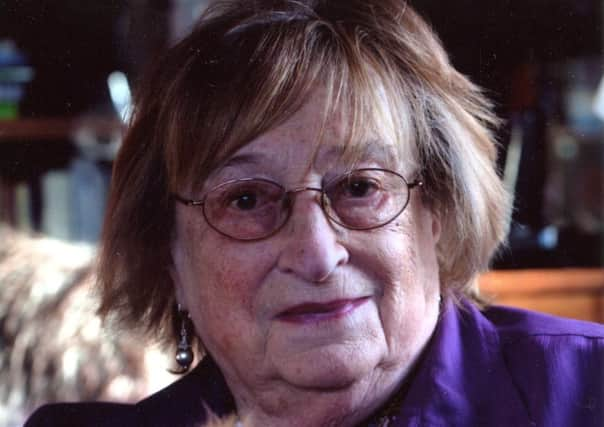'We have to learn to live together,' says Holocaust survivor


HOLOCAUST survivor Iby Knill’s plea for tolerance and understanding between different peoples provided a moving and thought-provoking testimony during a ceremony at the University of Huddersfield.
As a young woman, Jewish-born Iby, now aged 93, witnessed the horrors of Auschwitz.
Advertisement
Hide AdAdvertisement
Hide AdBorn in Slovakia she escaped to Hungary and took part in the Resistance before capture and imprisonment that included a spell in Auschwitz. It was on a forced march to Bergen Belsen in early 1945 that the appearance of US tanks meant that her German guards fled and she found freedom. She survived the Nazis, married a British officer and came to England in 1947.
It was not until 50 years later that she began to talk and write about her wartime experiences. Since then she has addressed more than 50,000 young people. Now, she has been awarded an Honorary Doctorate of the University of Huddersfield, in recognition of her contribution to memorialisation of the Holocaust.
It was conferred at one of the sequence of awards ceremonies taking place at the University of Huddersfield, during a week that saw almost 1,500 students receive their degrees. Although Iby, who is recovering from illness, was too ill to attend the ceremony, a live relay was set up by the University for her to be able to watch the proceedings. One of her three grandchildren, Julia Kinch, delivered an address at the ceremony that had been penned by her grandmother.
“I consider this award not just a personal honour, but an honour to all the others who stand as witnesses to how far human cruelty can go,” stated Mrs Knill, who urged the audience to remember the millions who did not survive Nazi persecution. Her testimony continued: “After the Second World War there were millions of displaced persons like myself in Europe – we were not called refugees then. It took people like myself at least five years to acquire language skills, create relationships, establish new homes and find work.
Advertisement
Hide AdAdvertisement
Hide Ad“Our task was a massive one, and it played itself out over the whole of Europe and the Middle East. Eventually, we were accepted.
“Think of the ‘us-and-them’ syndrome that allows us to fear anyone who is different, seeing them as the enemy. It is this fear that makes us hit out, because they’re not like us – somehow not human.
“We forget that difference is valuable, and makes us all interesting. It enriches life. It would be boring if we were all the same. We have to learn to live together and value each other. Standing by on the other side is not an option.
“Each one of us has the potential to make the world a better place. There are two things we must remember: Under the skin we are all the same and every one of you can make a difference.” An oration for Iby, who lives in Leeds, was delivered by the Deputy Vice-Chancellor of the University of Huddersfield, Professor Tim Thornton.